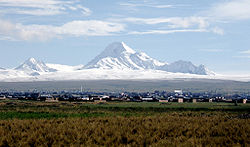NYT: At Climate Talks, a Familiar Standoff Between U.S. and China
Dec 8th, 2011 | By admin | Category: Energy and Carbon Emissions (Comment: Another year and another round of UN climate talks where finger-pointing, feet dragging, and back-and-forth discussions is the norm.
(Comment: Another year and another round of UN climate talks where finger-pointing, feet dragging, and back-and-forth discussions is the norm.
As reported by the New York Times, China signaled that it would be open to signing a formal treaty limiting emissions after 2020 but with conditions that make serious efforts unlikely to happen. The stumbling block that has been in the path of progress and agreement has been the developed countries historical carbon emissions and the right of developing countries to grow without hampering their economic development.)
According to John Broder of the New York Times:
China, the world’s biggest greenhouse gas emitter, has once again emerged as the biggest puzzle at international climate change talks, sending ambiguous signals about the role it intends to play in future negotiations. This week, the nation’s top climate envoy said that China would be open to signing a formal treaty limiting emissions after 2020 — but laid down conditions for doing so that are unlikely ever to be met.
China’s lead negotiator at the United Nations climate change talks here, Xie Zhenhua, said that China was prepared to enter into a legally binding agreement after current voluntary programs expire at the end of the decade, seemingly a major step. China has always contended that because of its rapid economic growth and the persistent poverty of millions of its citizens, it cannot be bound by the same emissions standards as advanced industrialized nations.
Mr. Xie outlined five conditions under which China would consider joining such a treaty as a full partner, the major one being that China and other rapidly growing economies must be treated differently from the so-called rich countries. But that has been a deal-breaker for the United States for years and is the central reason that the Senate refused to even consider ratifying the Kyoto Protocol, a 1997 agreement whose goal, still unmet, is to limit global greenhouse gas emissions.
Read the entire article here.
